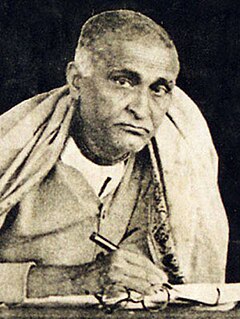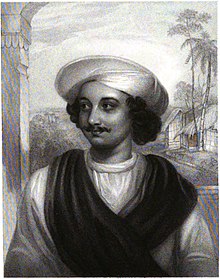
Chaitanya Mahaprabhu was a 15th century Indian Saint, who is considered to be the combined avatar of Radha and Krishna by his disciples and various scriptures. Chaitanya Mahaprabhu's mode of worshipping Krishna with ecstatic song and dance had a profound effect on Vaishnavism in Bengal. He was also the chief proponent of the Vedantic philosophy of Achintya Bheda Abheda Tattva. Mahaprabhu founded Gaudiya Vaishnavism. He expounded Bhakti yoga and popularized the chanting of the Hare Krishna Maha-mantra. He composed the Shikshashtakam.

Bhaktisiddhanta Sarasvati, born Bimala Prasad Datt, was a Gaudīya Vaisnava Hindu guru, ācārya, and revivalist in early 20th century India. To his followers, he was known as Srila Prabhupāda.
Kannada (ಕನ್ನಡ) is the language spoken in Karnataka. Karnataka has eight Jnanapeeth award winners, the highest honor bestowed for Indian literature. From the period of Adikavi Pampa(ಆದಿಕವಿ ಪಂಪ) who proclaimed his wish to be reborn as a little bee in the land of Kannada, Kannada poetry has come a long way to Kuvempu (ಕುವೆಂಪು) and Dattatreya Ramachandra Bendre

Bengali music comprises a long tradition of religious and secular song-writing over a period of almost a millennium. Composed with lyrics in the Bengali language, Bengali music spans a wide variety of styles.

The Gita Govinda is a work composed by the 12th-century Hindu poet, Jayadeva. It describes the relationship between Krishna and Srimati Radhika and the gopikas of Vrindavana.

Michael Madhusudan Dutt was a Bengali poet and playwright.

Bhaktivinoda Thakur, born Kedarnath Datta, was a Hindu philosopher, guru and spiritual reformer of Gaudiya Vaishnavism who effected its resurgence in India in late 19th and early 20th century and was hailed by contemporary scholars as the most influential Gaudiya Vaishnava leader of his time. He is also credited, along with his son Bhaktisiddhanta Sarasvati, with pioneering the propagation of Gaudiya Vaishnavism in the West and its eventual global spread.

Shankha Ghosh was an Indian poet and critic.

Jayanta Mahapatra is an Indian English poet. He is the first Indian poet to win a Sahitya Akademi award for English poetry. He is the author of poems such as Indian Summer and Hunger, which are regarded as classics in modern Indian English literature. He was awarded a Padma Shri, the fourth highest civilian honour in India in 2009. He returned the award in 2015 to protest against rising intolerance in India.
Kanhaiyalal Sethia was a well-known Rajasthani and Hindi poet. He was born in Sujangarh, Churu District in the Indian state of Rajasthan. He was a passionate supporter of making Rajasthani, the mother tongue of the people of Rajasthan, at the union level. He was a government-recognized freedom fighter, social worker, reformer, philanthropist and environmentalist.

Henry Louis Vivian Derozio was an Anglo-Indian poet and assistant headmaster of Hindu College, Kolkata. He was a radical thinker of his time and one of the first Indian educators to disseminate Western learning and science among the young men of Bengal.

Vaishnava-Sahajiya is a form of tantric Vaishnavism centred on Bengal, India. It had precursors from the 14th century, but originated in its definitive form in the 16th century.
Kamala Surayya , popularly known by her one-time pen name Madhavikutty and married name Kamala Das, was an Indian poet in English as well as an author in Malayalam from Kerala, India. Her popularity in Kerala is based chiefly on her short stories and autobiography, while her oeuvre (works) in English, written under the name Kamala Das, is noted for the poems and explicit autobiography. She was also a widely read columnist and wrote on diverse topics including women's issues, child care, politics among others etc.
Jnanappana is a devotional poem written by the 16th century Malayalam poet Poonthanam. This poem written as a devotional prayer to Guruvayoorappan is considered as an important work in Malayalam literature. Written in simple Malayalam, the Jnanappana was Poonthanam's magnum opus and is an important work of Bhakti literature from Kerala and is revered for its poetic merit and intensity of devotion.

Vijayanagara literature in Kannada is the body of literature composed in the Kannada language of South India during the ascendancy of the Vijayanagara Empire which lasted from the 14th through the 16th century. The Vijayanagara empire was established in 1336 by Harihara I and his brother Bukka Raya I. Although it lasted until 1664, its power declined after a major military defeat by the Shahi Sultanates in the battle of Talikota in 1565. The empire is named after its capital city Vijayanagara, whose ruins surround modern Hampi, now a World Heritage Site in Karnataka.
Aziz Mohammad Khan (1931–1992) or Aziz Qaisi was an Urdu poet, short story writer, and film writer. He was born and educated in Hyderabad, Telangana. He started writing early and established himself as a poet and story writer. He moved to Mumbai in the late nineteen-fifties, and became an active part of Mumbai's literary and film scene. He was associated with a number of films, including Kunwara Baap, Ankur, and Dayavan. Early in his life, he became associated with the Progressive Writers' Movement, which had a presence in Hyderabad and Mumbai.

Jagannatha Dasa (1728–1809), a native of Manvi town in the Raichur district, Karnataka state, India,is a disciple of Madhvacharya and is considered one of the notable Haridasa of Dvaita Vedanta of Madhva saint-poets of the Kannada language. Apart from authoring numerous well-known devotional songs that propagate the Vaishnava bhakti ("faith") of Dvaita Vedanta of Madhvacharya, Jagannatha Dasa wrote the Harikathamritasara in the native shatpadi metre and Tattva suvali in the native tripadi metre. He was also an accomplished scholar in the Sanskrit language.

The Vaishnava Padavi movement refers to a period in medieval Bengali literature from the 15th to 17th centuries, marked by an efflorescence of Vaishnava poetry often focusing on the Radha-Krishna legend. The term padavali has the literal meaning "gathering of songs".

KabisurjyaBaladeba Ratha was an Indian poet who wrote in the Odia language, and a composer and musician of Odissi music. He wrote in both Sanskrit and Odia. His works are known for devotional quotient. He is the credited founder of the Dhumpa Sangita. Kabisurjya has composed hundreds of songs in the tradition of Odissi music, employing traditional ragas & talas unique to Odissi. His magnum opus Kisorachandrananda Champu is a cornerstone of the Odissi music repertoire & Kabisurjya is widely renowned for his masterful compositions.

Anwar Ali also known Anvar Ali is an Indian poet, lyricist, translator, and documentary filmmaker. He has been contributing to poems and poetic studies in Kerala since 1984.















